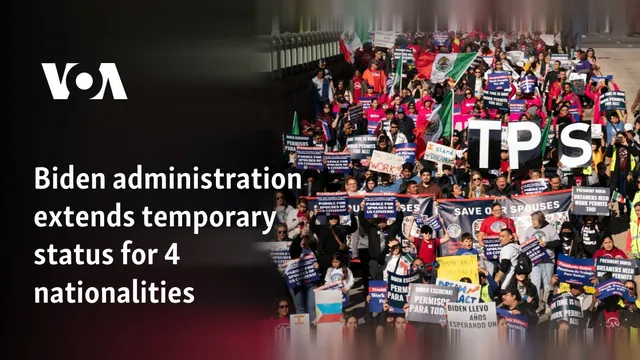
Biden protects immigrants from deportation amid crises in Sudan, Ukraine, and Venezuela
2025-01-14 08:00- The Biden administration has extended TPS for nearly 1 million immigrants from El Salvador, Sudan, Ukraine, and Venezuela.
- This extension protects immigrants legally in the U.S. due to unsafe conditions in their home countries.
- TPS enables these immigrants to renew work permits and prevents deportation, though its future remains uncertain under the incoming administration.
Express your sentiment!
Insights
In the United States, the Biden administration recently announced an extension of Temporary Protected Status (TPS) for nearly 1 million immigrants hailing from El Salvador, Sudan, Ukraine, and Venezuela. This decision comes as political and economic instability in these countries make it unsafe to deport their citizens. The extension allows Salvadorans, Sudanese, Ukrainians, and Venezuelans with TPS to renew both their work permits and deportation protections. The TPS program was established as a temporary refuge for those from countries facing severe emergencies, ensuring that individuals are not sent back to dangerous conditions. Approximately 600,000 Venezuelan immigrants will benefit from this extension, along with more than 230,000 Salvadorans, over 103,000 Ukrainians, and around 1,900 Sudanese. The Lebanon, Nicaragua, and Honduras among others are also under consideration for TPS by advocates, due to ongoing crises in these regions. Despite pressures to expand TPS to cover more nations, the Biden administration has opted not to include newly arriving migrants in this extension, aiming to mitigate potential critiques from the incoming Trump administration, known for its hardline immigration policies. The renewed TPS protections come at a time when President Donald Trump is set to take office, with promises to implement stricter immigration laws and mass deportations. The extension notably provides relief as many TPS recipients have lived in the U.S. for decades, particularly Salvadorans who first gained this status in 2001 following devastating earthquakes. Critics of TPS argue that its prolonged use raises questions about the temporary nature of status that was meant to address immediate crises. This decision reflects the administration's commitment to humanitarian principles and consideration for the complexities involved with international immigration policies. However, the future of TPS remains uncertain under potential changes expected from the new administration. As discussions about immigration continue, advocates emphasize the importance of protecting individuals displaced by circumstances beyond their control and the need for a more comprehensive approach to immigration reform.
Contexts
Temporary Protected Status (TPS) is a form of humanitarian relief for individuals from designated countries facing ongoing armed conflict, environmental disasters, or extraordinary conditions. TPS allows eligible individuals to remain in the United States temporarily, without the fear of deportation and with the ability to apply for work authorization. The program aims to provide necessary protection to people who cannot safely return to their home countries due to extreme circumstances. To qualify for TPS, applicants must demonstrate that they meet specific eligibility requirements set by the U.S. Citizenship and Immigration Services (USCIS). These requirements typically include being a national of a TPS-designated country, having continuously resided in the U.S. since the date specified for that country's designation, and not having been convicted of certain crimes that would render them ineligible for TPS. Additionally, individuals must prove they are not a threat to public safety or national security. Countries are designated for TPS based on assessments by the U.S. Secretary of Homeland Security regarding the conditions in the country. These assessments consider factors such as armed conflict, natural disasters, and whether individuals are able to safely return. Designations for TPS can be temporary and may change depending on improvements or deteriorations in the conditions of the home country. It is crucial for individuals wishing to apply or reapply for TPS to stay updated on their home country's status and any expiration dates for their TPS designation. TPS does not lead directly to permanent residency, but if granted, individuals can reapply for renewal as long as their country remains on the TPS list and they continue to meet eligibility requirements. The application process for TPS involves submitting Form I-821, Application for Temporary Protected Status, along with required documentation that proves identity, eligibility, and continuous residence in the U.S. Applicants also need to file for work authorization using Form I-765, Application for Employment Authorization, if they wish to work while under TPS. Processing times can vary, but applicants are encouraged to apply as soon as possible after their country is designated to avoid lapsing in status. Given the complexities involved in the TPS program, individuals are often advised to seek guidance from legal experts or accredited representatives to ensure they meet all requirements and may benefit from public resources that provide information on TPS. As of January 2025, it is imperative for TPS beneficiaries to remain aware of any changes to their status and upcoming deadlines for reapplication. It is also worth noting that TPS may be subject to legislative changes, which could impact its future availability and the specific requirements for eligibility. For foreign nationals seeking safety and stability during times of crisis, TPS plays a critical role in U.S. immigration policy by offering temporary protection in a challenging political landscape. Individuals eligible for TPS should stay well-informed and proactive about maintaining their legal status in the United States.